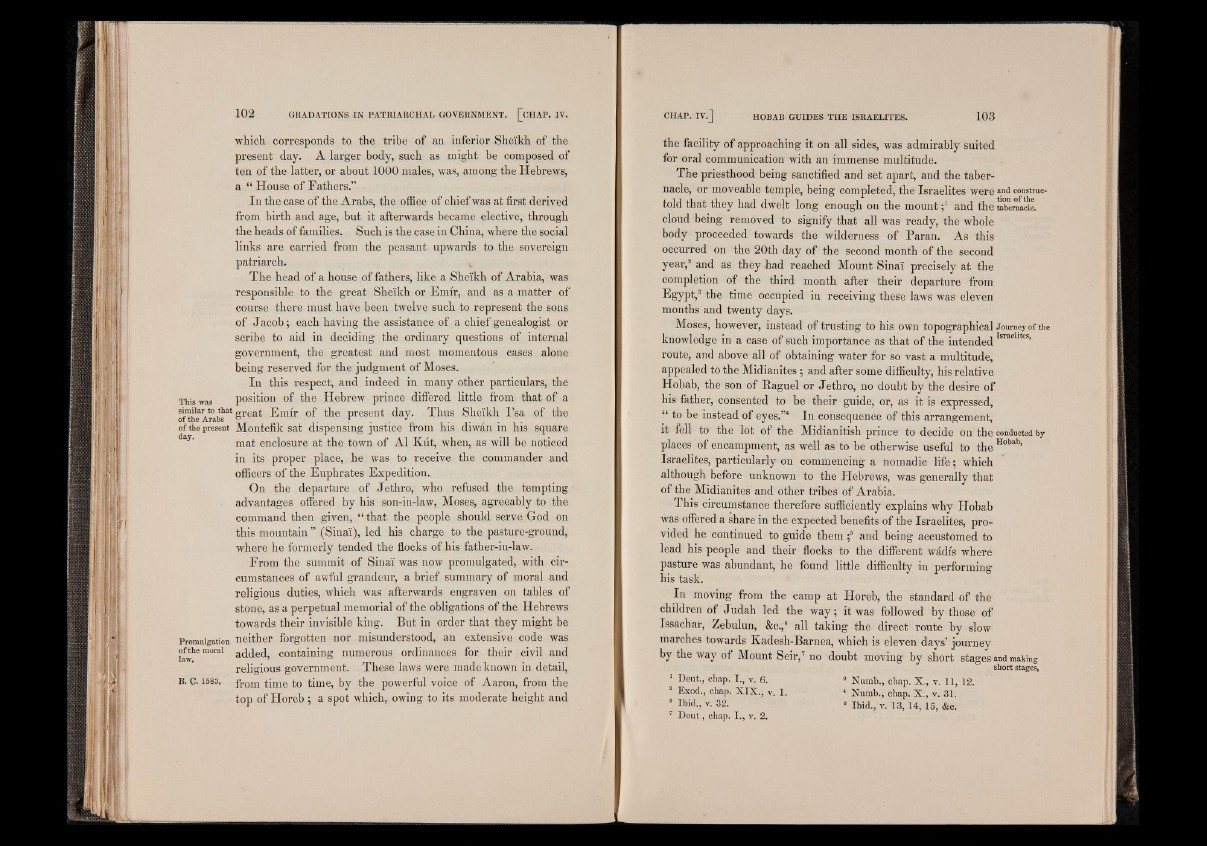
which corresponds to the tribe of an inferior Sheikh of the
present day. A larger body, such as might be composed of
ten of the latter, or about 1000 males, was, among the Hebrews,
a “ House of Fathers.”
In the case of the Arabs, the office of chief was at first derived
from birth and age, but it afterwards became elective, through
the heads of families. Such is the case in China, where the social
links are carried ftom the peasant upwards to the sovereign
patriarch.
The head of a house of fathers, like a Sheikh of Arabia, was
responsible to the great Sheikh or Emir, and as a matter of
course there must have been twelve such to represent the sons
of Jacob; each having the assistance of a chief genealogist or
scribe to aid in deciding the ordinary questions of internal
government, the greatest and most momentous cases alone
being reserved for the judgment of Moses.
In this respect, and indeed in many other particulars, the
This was position of the Hebrew prince differed little from that of a
onteArabsat Srea^ Emir of the present day. Thus Sheikh I ’sa of the
of the present Montefik sat dispensing justice from his diwan in his square
mat enclosure at the town of A1 Kut, when, as will be noticed
in its proper place, he was to receive the commander and
officers of the Euphrates Expedition.
On the departure of Jethro, who refused the tempting '
advantages offered by his son-in-law, Moses, agreeably to the
command then given, “ that the people should serve God on
this mountain ” (Sinai), led his charge to the pasture-ground,
where he formerly tended the flocks of his father-in-law.
From the summit of Sinai was now promulgated, with circumstances
of awful grandeur, a brief summary of moral and
religious duties, which was afterwards engraven on tables of
stone, as a perpetual memorial of the obligations of the Hebrews
towards their invisible king. But in order that they might be
Promulgation neither forgotten nor misunderstood, an extensive code was
Sawhem°ral added, containing numerous ordinances for their civil and
religious government. These laws were made known in detail,
B. c. 1583, from time to time, by the powerful voice of Aaron, from the
top of Horeb ; a spot which, owing to its moderate height and
the facility of approaching it on all sides, was admirably suited
for oral communication with an immense multitude.
The priesthood being sanctified and set apart, and the tabernacle,
or moveable temple, being completed, the Israelites were and constmc-
told that they had dwelt long enough on the m o u n ta n d the tabernacle,
cloud being removed to signify that all was ready, the whole
body proceeded towards the wilderness of Paran. As this
occurred on the 20th day of the second month of the second
year,8 and as they had reached Mount Sinai precisely at the
completion of the third month after their departure from
Egypt,3 the time occupied in receiving these laws was eleven
months and twenty days.
Moses, however, instead of trusting to his own topographical Journey o f the
knowledge in a case of such importance as that of the intendedIsraelltes’
route, and above all of obtaining water for so vast a multitude,
appealed to the Midianites; and after some difficulty, his relative
Hobab, the son of Raguel or Jethro, no doubt by the desire of
his father, consented to be their guide, or, as it is expressed,
“ to be instead of eyes.”4 In consequence of this arrangement,
it fell to the lot of the Midianitish prince to decide on the conducted by
places of encampment, as well as to be otherwise useful to the Hobab’
Israelites, particularly on commencing a nomadic life; which
although before unknown to the Hebrews, was generally that
of the Midianites and other tribes of Arabia,
This circumstance therefore sufficiently explains why Hobab
was offered a share in the expected benefits of the Israelites, provided
he continued to guide them ;5 and being accustomed to
lead his people and their flocks to the different wadis where
pasture was abundant, he found little difficulty in performing
his task.
In moving from the camp at Horeb, the standard of the
children of Judah led the way; it was followed by those of
Issachar, Zebulun, &c.,6 all taking the direct route by slow
marches towards Kadesh-Barnea, which is eleven days’ journey
by the way of Mount Seir,7 no doubt moving by short stages and making
short stages,
1 Deut., chap. I., v. 6. * Numb., chap. X., v. 11, 12.
a Exod., chap. X IX ., v. 1. 4 Numb., chap. X., v. 31.
5 Ibid., v. 32. • ibid., v. 13, 14, 15, &c.
7 D e u t, chap. I ., v. 2.